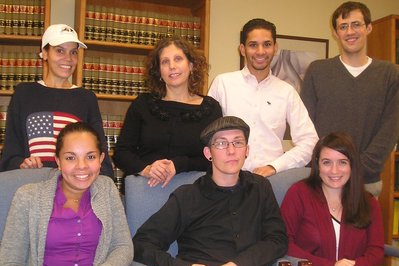The AIDS Law Project of Pennsylvania will celebrate its 25th anniversary in style next week at a Center City gala fundraiser.
“We look at our 25th anniversary as an opportunity to recognize the clients, the staff and all the supporters over the years,” said agency director Ronda B. Goldfein. “We hope that folks will come to join us, to celebrate what we’ve accomplished and support us for the work that’s yet to be done.”
The festivities begin 6 p.m. Nov. 7 at Power Plant Productions in Old City. There will be entertainment and catered food. Tickets are $100 per person.
“It’s a cocktail party and folks should feel comfortable wearing whatever they would wear to a cocktail party,” Goldfein said. “There will be an ample seating area, with a lounge feeling.”
The organization was formed 25 years ago by David Webber, an attorney who saw the need for more legal representation for people with HIV/AIDS.
The agency provides free legal services in a wide range of areas: housing, antibias efforts, privacy rights, income replacement, estate planning, job re-entry, home and hospital visits, access to health care, mortgage assistance and debt resolution.
Webber said the agency holds a special place in his heart.
“I consider myself the father of the agency,” he said. “It was my baby. We were having so many [antibias] cases, and nobody wanted to take the cases. We needed to set up a nonprofit organization so we could raise money to take the cases and do the advocacy.”
Webber left the agency in 1992, but said he’s gratified that it continues to meet the needs of the community.
“It was very productive and stable when I left, and they seem to be doing very well,” he added. “It has a very good reputation in the community, and I like to think I set a high level of professionalism. I feel as if I left it in good hands. And it remains in good hands under Rondee’s leadership.”
Goldfein said the agency currently has 10 staffers, several volunteer consultants and volunteer attorneys and a budget of just over $900,000.
“We always welcome more support,” she added.
Fundraising is a large part of her job, though she also maintains a sizable case-load.
“Like many nonprofits, we’ve had ebbs and flows with our funding,” she noted.
Goldfein said the agency has assisted about 38,000 people over the years. Clients include a man with HIV tossed out of a gym, a woman with HIV kicked out of a personal-care home and a teenager with HIV refused admittance to a boarding school.
“Name the industry, name the profession, name the activity and we’ve heard a complaint about it,” Goldfein said. “We’ve represented a variety of people who’ve tried to get goods or services, or tried to get or keep a job. We’ve represented the person who tried to get a bikini wax, a haircut, a tattoo, surgery.”
She said lawsuits handled by the law project can bring about social change, in addition to vindicating the victim’s rights.
“We want to compensate clients for what happened, and also see some good come of the wrong act.”
Goldfein noted that the agency successfully sued city emergency-medical workers for refusing to treat people with AIDS, which helped ensure that such workers practice infection control with every patient.
Before federal privacy laws were in place, the agency successfully sued a national pharmacy for sharing prescription information with a client’s employer.
The agency also brought about a state-policy clarification that HIV cannot be the basis for denying an occupational license.
“People need to use common sense and realize that HIV isn’t transmitted through casual contact,” Goldfein said.
She expressed pride in the agency’s accomplishments.
“We’ve pursued cases and policies that we believe are in the best interest of people with HIV. We’ve won every case we’ve taken on. But we haven’t won all the policy fights. If you win everything, you’re not taking the hard-enough challenges.”
The agency opposed a state Health Department plan to collect the names of people with HIV, but that plan eventually was implemented.
“I’m still not convinced that unique identifiers aren’t a better choice over names,” Goldfein noted. “But that’s the law, and I respect the law.”
She lauded the courage of the agency’s clientele.
“A lot of advances we’ve made have been on the backs of people with AIDS,” she said. “We’ve been inspired by all of them. The clients who’ve walked through our doors are part of the AIDS Law Project’s legacy. And there’s 38,000 of them.”
Goldfein said she’d be delighted if the health crisis ends, and the agency could go out of business.
“If there were big changes in social justice, if there was no more stigma, no more discrimination, if clients got the income replacement they needed, if Obamacare works — we’d all be happy to take several days at the beach. But until then, you’ll find us in the office.”
